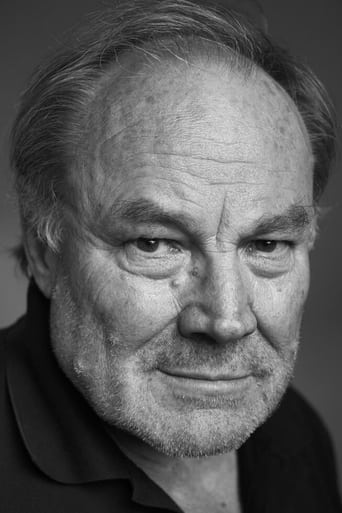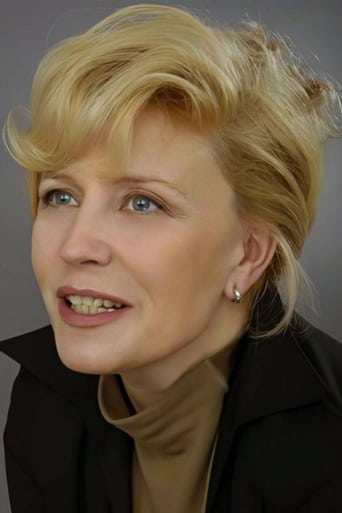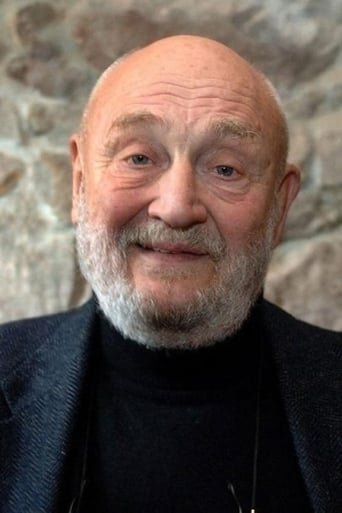Claysaba
Excellent, Without a doubt!!
Numerootno
A story that's too fascinating to pass by...
Josephina
Great story, amazing characters, superb action, enthralling cinematography. Yes, this is something I am glad I spent money on.
Fleur
Actress is magnificent and exudes a hypnotic screen presence in this affecting drama.
michaelgfalk
Mephisto is disquieting, ironic movie. Its star is Klaus Brandauer, who plays Henrik Hoefgen, a German actor slumming it in Hamburg in the 1930s, and dreaming of stardom just as the Nazis come to power. His moral challenge is obvious: to resist the Nazis, or work within the system? Brandauer is fabulous through the movie's twists and turns, and though occasionally clumsy, manages to convey Hendrik's timidity, self-deception, pride and guilt as he moves through a violent and chaotic world.The movie is based on Klaus Mann's novel of the same title. Mann was part of a literary dynasty. His father was Thomas Mann, the famous Nobel-prizewinning writer of "Buddenbrooks," "The Magic Mountain," and "Death in Venice." His uncle was Heinrich Mann, a no less famous writer in his day, known to film-goers as the writer of "Professor Unrat," which became the great Marlene Dietrich film "Der Blaue Engel."The movie, in a way, plays out the debate that the two elder Mann brothers had about art and politics. Thomas always felt aloof from politics, ensconced in the purer regions of art and culture. During WWI, he published a book called "Reflections of an Unpolitical Man," whose title says it all. Heinrich was a satirist, who believed that art must contribute to the betterment of society, and that it could not avoid being political. Their debate continued into the Nazi era, though to say how their minds changed would spoil this film."Mephisto" is occasionally a little obvious or simplistic, and some of the minor characters are unconvincing, but Brandauer shines in the main role, and the music, set design and camera-work are superb. A scene early in the movie, when the Hitler Youth meet in the street, looks and sounds like a sick parody of Riefenstahl.This will always be a timely film, and certainly earned its Oscar.
Ilpo Hirvonen
Mephisto is a German film by a Hungarian filmmaker István Szabó. It was received very well since it won an Oscar for Best Foreign Film and an award for Best Screenplay at the Cannes Film Festival. It's a historical film which takes place at pre-WWII Germany, during the rising of the National Socialists. Even though its references to the epic tale of Faust are obvious, the film doesn't fall to highlighting nor underestimation of the viewer. It's a clever film, characterized by strong aesthetic styling, about art, evil and people living in the shadows of power.A German stage actor Hendrik Hoefgen has to choose between his political ideologies and his career when the Nazis win the election in the year 1933. He has to abandon the left-wing circles in which he has been working before. He's a married man but has an affair with a black German woman. Germany wants to destroy all arts that aren't truly German, due to which Hendrik gets the role of Mephisto. He has to keep playing this role which is in the popularity of the Nazis, in order to keep his highly valued status. Faust is Germany's national epic which is an ancient folks tale but generally known as written by Johann Wolfgang von Goethe. It's a story about a man who sells his soul to the Devil. Quite an eternal tale; Faustian contracts are signed every now and then in the modern world. Mephisto is a fictional character in the book. He wagers with the archangel Gabriel that every man can be enticed to join the dark side. Gabriel chooses Faust, a religious servant of God, as their target of the bet. Mephisto sends a plague to Faust's village and the villagers ask for a helping hand from him. But Faust is unable to help the villagers because God doesn't answer to his prayers. Totally desperate, Faust resorts to Mephisto the demon. Mephisto agrees to help but at the same makes him an offer -- eternal youth with all its pleasures. In order to attain this, Faust must sell his soul.This is how the story goes or at least the original folks tale with which I am more familiar with, compared to Goethe's book. But back to the film. Once, when Hendrik has just performed at stage as Mephisto, he goes up the stairs to the box seat of a Nazi general. The general flatters him and they talk a little. The audience turns around and starts staring at them. The play is no longer performed at stage but in the seats, in the life of the real characters of history. This is the scene where fiction becomes reality. The camera takes a long shot of the theater hall as Hendrik, or Mephisto as the general calls him, shakes hands with the general -- a Faustian contract has been signed.To my mind, the film realized brilliantly how to use the face of Mephisto. First on Hendrik, then on the German officers around him and then on his wife. The face equals the mark of evil. It represents something Hendrik has now turned into. And, in the final scene, he runs to the field, followed by the spotlight, stops and says: "What do they want from me now? After all, I am just an actor." This reminds one of the actual events that occurred after WWII. The trial of Nurnberg for instance, and other smaller trials. Many artists were accused for working for the Nazis. But Hitler's propaganda-filmmaker, Leni Riefenstahl, for example said that she only made movies, nothing else. So is one either part of the solution or part of the problem? The themes of evil, art and inner darkness characterize this aesthetically stylized historical war film. The face of Mephisto turns into an icon which collects symbolic meaning to itself. It's a mask, so what do we find behind it when it is dropped down and the truth is revealed. In the end, when the camera takes a freeze-frame shot of Hendrik's face, we see the truth. The artificiality, the illusionary world and the facade are now destroyed. We see the protagonist as a human being begging for mercy. But not only the face of evil and society are revealed, also the faces of fiction, art and cinema.
Boris European
Even after seeing Szabo's "Mephisto" a couple of times, it is still difficult to see through the actor Hoefgen, played brilliantly by one of the best actors, Klaus Maria Brandauer. Accompanying his rise to prominence, the viewers come to face important questions about morality, friendship, leadership, fame...At the beginning, Hoefgen dislikes the upcoming and dangerous Nazi clique. Yet, when he realizes that they are willing to give him the chance to become famous and respected, signs of hesitation can be hardly found - he grasps the opportunity to be in Berlin and be a director of the National Theatre. "I'am not interested in money", he says, however, he has already sold his soul to the devil (the Nazi party). Hoefgen has become the victim of his acclaimed theater character, Mephisto. Mephisto of the real world offered him to "win the crown of mankind" as Hoefgen did in his theater role, and the latter willingly accepted it. He closed his eyes to the beatings of the Jews he witnessed, the expelling of his lover, the escape of his wife, the banning from theater of his friends, etc.And yet, has he become the reincarnation of evil, the real Mephisto? I am inclined to think that Hoefgen had good intentions about his closest who opposed the system. This is shown by the fact that he insisted in front of the Nazi officials for his black lover to leave Nazi Germany safely and that his friend, Ulrichs, be rehabilitated. And he did it successfully. At that point comes the question whether Hoefgen made the right choice - should he have gone to the opposition and thus failed to save anyone, or he did the right thing by accepting Mephisto's offer and becoming a man of certain influence which he used to save his closest? Then again, do you close your eyes to the brutality around you as long as you and your friends are safe? A very interesting comparison can be made between the actor Miklas, played by the Hungarian Cserhalmi and also seen in the Czech Oscar-nominated production "Zelary" and other legendary films by the Hungarian directors Bela Tarr and Miklos Jancso, and Hoefgen. The former is an ardent supporter of the Nazis at the beginning but later becomes disillusioned and chooses the opposition. Hoefgen, on the other hand, moves in the opposite way in the movie. From an opponent of the Nazi "Mörderpakt" ("murderous thugs") as he calls them at the beginning, he becomes a follower (albeit no participant) and goes as far as to betray Miklas and his plan to the Nazi officials, resulting into Miklas' death. At the moment when Hoefgen learns about his death, he refuses to believe he was murdered but instead insists it was a car accident. In the close up of Brandauer's face talking to the woman, I believe the viewer can read regret in his eyes...Through both characters, and mainly through Hoefgen, Szabo raises the topic of the role of the intelligentsia in the Nazi rise to power. What were they supposed to do? The ones in the opposition either died or went into exile (as Hoefgen's wife). The rest followed the Nazis, willingly or not. In that age of hopelessness, should one sell his soul to Mephisto as Hoefgen did - then rise to power and save whomever you can? Overall, are we from our position nowadays able to judge how the intelligentsia/the actors should have acted? "Mephisto" has to be seen in the light of Szabo's life. It was recently revealed he was an informant for the Hungarian government in the 50's. In an interview he claimed to have saved himself and a friend of his from "being gibbeted". Resemblance to Hoefgen...? The towering performance of Brandauer as Hoefgen is absolutely stunning. His face, stature, looks, eyes, everything fits perfectly into the image of the divided personality of the main character (indicative of this personality is the Nazi general's inquiring why Hoefgen has such a soft handshake). Regarding the images, there is hardly a viewer who can forget Mephisto's white face on Brandauer and the shots of Hoefgen's moments of madness, estimation, megalomania, anger...Especially powerful is the last scene where Hoefgen is running and trying to hide from the giant searchlights of Olympiastadion in Berlin, his curved, almost crying face, and saying, "Was wollt ihr von mir? Ich bin nur ein Schauspieler.", "What do you want from me? I'm just an actor........"
whpratt1
Discovered this film which was showing on TV in the early hours of the AM and enjoyed the entire story about a German actor who reached the top of his career in Nazi controlled Germany. Klaus Maria Brandauer,(Hendrik Hoefgen) played the role of this actor who was a perfectionist in his field of acting on the stage and was very successful in performing his role as Mephisto (The Devil) in "Faust" and the German people and Nazi's who loved his performance. The Nazi's decided to use Hendrik Hoefgen as their State Theatre Director and use this position as a propaganda platform in the Threate Arts and deceive the German people. Hendrik Hoefgen had a strong desire to present "Hamlet" to the German people and it seems that once this performance was presented, his career started to decline from the lime lights and the Nazi Government. There is an inter-racial love affair going on by Hendrik Hoefgen which adds a great deal of love and romance besides all his other lovers. Great Film, enjoy.





